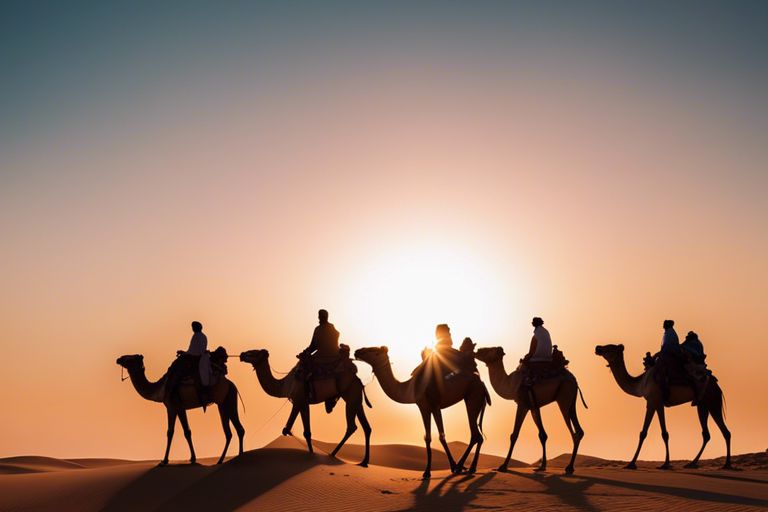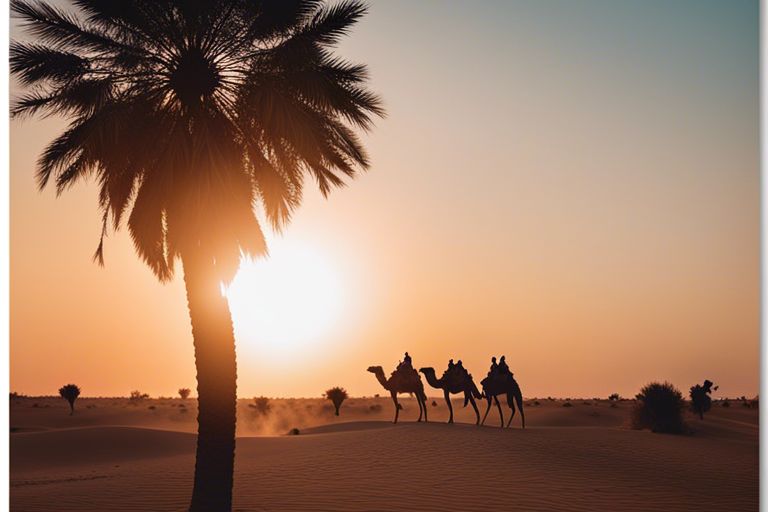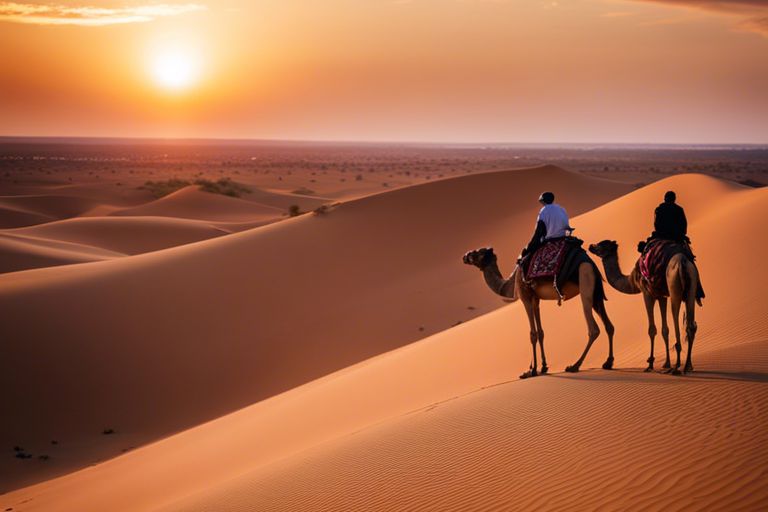Are you dreaming of commenceing on an unforgettable desert adventure in North Africa? As you plan your trip, you’re probably wondering when to go to make the most of your experience. The truth is, the best time to visit North Africa for desert tours depends on your preferences and what you’re looking for. Do you want to avoid the scorching heat, or are you up for a thrilling winter expedition? In this guide, we’ll break down the seasons and help you decide when to visit North Africa’s majestic deserts for an unforgettable journey.
Key Takeaways:
- Weather Conditions: The best time to visit North Africa for desert tours is during the spring (March to May) and autumn (September to November) when the weather is mild and comfortable, with average temperatures ranging from 15°C to 25°C (59°F to 77°F).
- Avoid Summer Heat: It’s best to avoid visiting North Africa during the summer months (June to August) when temperatures can soar up to 45°C (113°F) in the desert, making it unbearable for tourists.
- Winter Chills: Winters in North Africa can be chilly, especially in the desert, with temperatures dropping to as low as 5°C (41°F) in December and January. If you’re planning to visit during this time, pack warm clothing.
- Ramadan and Tourism: If you’re planning to visit North Africa during Ramadan (the Islamic holy month of fasting), be prepared for changes in tourist infrastructure and services, as many locals observe the fast.
- Festivals and Events: North Africa hosts various festivals and events throughout the year, such as the Marrakech International Film Festival and the Essaouira Gnawa Music Festival. Plan your visit accordingly to experience the local culture.
- Sahara Desert Tours: If you’re interested in taking a Sahara Desert tour, consider visiting between October and February when the skies are clear, and the stars are visible, making for a breathtaking experience.
- Responsible Tourism: Be mindful of your environmental impact and choose responsible tour operators that follow sustainable tourism practices to preserve the region’s natural beauty and cultural heritage.
Understanding Desert Tours in North Africa
Your adventure in North Africa’s vast deserts awaits! To make the most of your trip, it’s necessary to understand the different types of desert tours available and what they entail.
Types of Desert Tours
You can choose from a variety of desert tour options, catering to different interests and preferences. These include:
- Camel treks: Explore the desert on camelback, a traditional mode of transportation.
- 4×4 safaris: Venture into the desert in a sturdy vehicle, perfect for dune bashing and scenic drives.
- Trekking tours: Hike through the desert landscape, taking in the stunning vistas and unique flora.
- Cultural tours: Focus on the region’s rich cultural heritage, visiting local villages and learning about traditional customs.
- Luxury tours: Indulge in comfort and luxury, with high-end accommodations and gourmet dining.
After choosing your preferred tour type, you’ll be ready to commence on an unforgettable desert adventure.
| Tour Type | Description |
| Camel Trek | Explore the desert on camelback, a traditional mode of transportation. |
| 4×4 Safari | Venture into the desert in a sturdy vehicle, perfect for dune bashing and scenic drives. |
| Trekking Tour | Hike through the desert landscape, taking in the stunning vistas and unique flora. |
| Cultural Tour | Focus on the region’s rich cultural heritage, visiting local villages and learning about traditional customs. |
Popular Desert Tour Destinations in North Africa
An array of captivating destinations awaits you in North Africa, each offering a unique desert experience.
Desert landscapes in North Africa are incredibly diverse, ranging from the endless dunes of the Sahara to the rugged terrain of the Atlas Mountains. As you explore these destinations, you’ll discover hidden oases, ancient ruins, and vibrant local cultures. From the majestic Erg Chebbi dunes in Morocco to the stunning Siwa Oasis in Egypt, each location offers a distinct adventure.

Factors to Consider When Planning a Desert Tour
If you’re planning a desert tour in North Africa, there are several factors to consider to ensure a successful and enjoyable trip.
- Climate and weather conditions
- Crowd and tourist season
- Cultural and religious events
- Safety and security concerns
This will help you prepare for your trip and make the most of your desert adventure.
Climate and Weather Conditions
Weather conditions in the desert can be extreme, with scorching heat during the day and freezing temperatures at night. You’ll need to pack accordingly and stay hydrated to avoid heat exhaustion.
Crowd and Tourist Season
Little do people know, the peak tourist season in North Africa’s deserts is during the winter months, from October to February. This is when the temperatures are milder, making it ideal for desert exploration.
This period is also when you’re likely to encounter more tourists, which can affect the authenticity of your experience. If you’re looking for a more secluded adventure, consider visiting during the shoulder season.
Cultural and Religious Events
To fully immerse yourself in the local culture, consider planning your trip around cultural and religious events, such as the Eid al-Fitr celebrations or the Marrakech International Film Festival.
Crowd-pulling events like these can add an extra layer of excitement to your trip, but be prepared for larger crowds and higher prices for accommodations.
Safety and Security Concerns
The safety and security of tourists in North Africa’s deserts can be a concern, especially for solo travelers or women. You’ll need to take necessary precautions, such as staying informed about local conditions and avoiding traveling at night.
Religious and political tensions can also affect safety, so it’s necessary to stay up-to-date with local news and follow government travel advisories.
Best Time to Visit North Africa for Desert Tours
Now that you’re planning your desert adventure in North Africa, it’s important to consider the best time to visit. The region’s climate varies greatly depending on the season, and each has its advantages and disadvantages.
Spring (March to May)
Any desert enthusiast will love spring in North Africa. The temperatures are mild, ranging from 20°C to 25°C (68°F to 77°F), making it ideal for long days of exploring the dunes. You’ll also avoid the crowds that flock to the region during peak season.
Autumn (September to November)
With the scorching summer heat dissipating, autumn is a great time to visit North Africa’s deserts. The temperatures are pleasant, and the landscape is particularly stunning, with the golden light of autumn illuminating the sand dunes.
North Africa’s autumn season is also characterized by minimal rainfall, ensuring that your desert tour won’t be disrupted by unexpected downpours. Additionally, the autumn foliage creates a picturesque backdrop for your desert adventure.
Winter (December to February)
Similar to spring, winter is another excellent time to visit North Africa’s deserts. The temperatures are cool, ranging from 10°C to 15°C (50°F to 59°F), making it perfect for hiking and exploring the dunes.
Winter is also an ideal time for stargazing in the desert, as the clear skies offer breathtaking views of the starry night sky. Just be sure to pack warm clothing for the chilly evenings.
Summer (June to August)
Marching into the summer season, you’ll encounter scorching temperatures, often reaching 40°C (104°F) or higher. While it may be challenging, summer is still a great time to visit North Africa’s deserts if you’re prepared.
For instance, many desert tour operators offer early morning and evening excursions to avoid the hottest part of the day. Additionally, summer is an excellent time to experience the local culture, as many festivals and events take place during this period.
Tips for Planning a Successful Desert Tour
Many travelers dream of exploring the vast dunes and majestic landscapes of North Africa’s deserts. To make the most of your desert tour, it’s imperative to plan carefully and be prepared for the challenges that come with traveling in these unique environments. Here are some valuable tips to get you started:
- Research, research, research: Learn as much as you can about the region, its culture, and its climate.
- Choose the right time to visit: Check out resources like Best time to visit Africa – Responsible Travel to ensure you’re traveling during the best season for desert tours.
- Plan ahead: Book your tour and accommodations well in advance to avoid last-minute hassles.
- Stay flexible: Be prepared for unexpected changes in your itinerary due to weather or other factors.
Any experienced traveler will tell you that careful planning is key to a successful desert tour.
Choosing the Right Tour Operator
If you’re new to desert travel, it’s crucial to choose a reputable and experienced tour operator who can guide you through the challenges of desert travel.
Packing Essentials for the Desert
Successful desert travelers know that packing the right gear is imperative to a comfortable and enjoyable trip.
Right from the start, make sure you have sturdy hiking boots, comfortable clothing, and a reliable water bottle. Don’t forget to pack sunscreen, a hat, and sunglasses to protect yourself from the harsh desert sun. A first-aid kit and a portable charger for your phone or camera are also must-haves.
Staying Healthy and Hydrated
Right from the moment you arrive in the desert, it’s imperative to prioritize your health and hydration.
To avoid dehydration, drink plenty of water throughout the day, and avoid strenuous activities during the hottest part of the day. Bring snacks like nuts and dried fruits to keep your energy levels up, and avoid eating heavy meals during the day. If you have any pre-existing medical conditions, be sure to consult with your doctor before begining on your desert adventure.
Respecting Local Culture and Environment
Even as you’re marveling at the breathtaking landscapes of the desert, remember to respect the local culture and environment.
Tour operators and local guides can provide valuable insights into the region’s customs and traditions. Be sure to follow their guidance and respect the local way of life. In terms of the environment, remember to take nothing but memories and leave nothing but footprints. Avoid littering, and try to minimize your carbon footprint by choosing eco-friendly tour operators and accommodations.

A Step-by-Step Guide to Planning Your Desert Tour
Once again, planning a desert tour in North Africa requires careful consideration and attention to detail. To help you navigate the process, we’ve broken down the key steps into a simple and easy-to-follow guide.
| Step | Description |
|---|---|
| 1. Researching and Booking Your Tour | Choose a reputable tour operator and book your tour in advance |
| 2. Preparing for Your Trip | Pack vital items, obtain necessary documents, and prepare physically |
| 3. What to Expect During Your Tour | Understand the itinerary, accommodations, and activities |
| 4. Making the Most of Your Desert Experience | Be open-minded, respectful, and prepared for the unexpected |
Researching and Booking Your Tour
Your search for the perfect desert tour begins with researching reputable tour operators and reading reviews from previous travelers. Be sure to book your tour well in advance to ensure availability and to secure the best rates.
Preparing for Your Trip
Guide yourself through a checklist of vitals, including packing comfortable clothing and sturdy shoes, obtaining necessary visas and travel documents, and preparing physically for the demands of desert travel.
Researching the local culture and customs will also help you better understand and appreciate the experience. Don’t forget to check the weather forecast and pack accordingly.
What to Expect During Your Tour
One of the most important aspects of planning your desert tour is understanding what to expect during your trip. Your tour operator should provide a detailed itinerary, but be sure to ask questions about accommodations, meal options, and activities.
During your tour, you’ll have the opportunity to experience the stunning natural beauty of the desert, learn about local traditions and customs, and enjoy thrilling activities like camel riding and sandboarding. Be prepared for early morning wake-up calls and long days of travel.
Making the Most of Your Desert Experience
Your desert tour is a once-in-a-lifetime experience, so be sure to make the most of it. Approach each day with an open mind and a sense of adventure, and don’t be afraid to try new things.
Planning ahead and being prepared for the unexpected will also help you stay focused on enjoying the experience. Remember to take plenty of photos, try local cuisine, and engage with your fellow travelers and guides.

Weighing the Pros and Cons of Desert Tours
Despite the allure of exploring the vast dunes and majestic landscapes of North Africa’s deserts, it’s crucial to weigh the pros and cons of taking a desert tour before begining on your adventure.
| Pros | Cons |
|---|---|
| Unique and unforgettable experiences | Risk of dehydration and heat exhaustion |
| Opportunity to see rare wildlife and plants | Unpredictable weather conditions |
| Chance to learn about local cultures and traditions | Physical demands of trekking and camping |
| Breathtaking sunrises and sunsets | Limited access to medical facilities |
| Experienced guides and support staff | Higher cost compared to other travel options |
| Memorable camping experiences under the stars | Potential for sandstorms and harsh winds |
| Opportunity to try local cuisine and drinks | Language barriers with local guides and communities |
| Unique photo opportunities | Risk of getting lost or stranded |
| Personal growth and challenge | Discomfort and fatigue from long travel days |
Advantages of Taking a Desert Tour
Tour operators often provide expert guides, support staff, and equipment, ensuring a safe and enjoyable experience. You’ll have the opportunity to immerse yourself in local cultures, try new foods, and take in the breathtaking scenery.
Disadvantages of Taking a Desert Tour
Touring the desert can be physically demanding, and you may face challenges such as harsh weather conditions, limited access to medical facilities, and language barriers with local guides and communities.
Desert travel requires careful planning, preparation, and flexibility. You’ll need to be prepared for unexpected events, such as sandstorms or equipment failures, and be willing to adapt to changing circumstances.
Mitigating Risks and Challenges
Tour operators often take extensive measures to ensure your safety, such as providing first aid training, emergency response plans, and regular check-ins. You can also take steps to prepare yourself, such as researching the tour operator, packing appropriate gear, and staying informed about local conditions.
Cons of desert travel can be mitigated by choosing a reputable tour operator, staying hydrated, and being mindful of your physical limitations. By doing so, you can minimize risks and focus on enjoying the unforgettable experiences that desert travel has to offer.
Final Words
To wrap up, you now have a better understanding of the best time to visit North Africa for desert tours. Remember to pack accordingly and plan ahead to make the most of your trip. If you’re still deciding between Tunisia and Morocco, consider checking out discussions like We are considering going on a tour to North Africa in January or February… to help make your decision. Whichever destination you choose, get ready for an unforgettable desert adventure!
FAQ
Q: What is the best time to visit North Africa for desert tours?
A: The best time to visit North Africa for desert tours is during the spring (March to May) and autumn (September to November). These periods offer mild temperatures, clear skies, and minimal rainfall, making it ideal for exploring the desert landscapes.
Q: What are the temperatures like in the North African desert during the summer months?
A: Summer temperatures in the North African desert can be extremely hot, often reaching up to 122°F (50°C) during the day and dropping to around 64°F (18°C) at night. It’s vital to take necessary precautions, such as staying hydrated, wearing protective clothing, and avoiding strenuous activities during the hottest part of the day.
Q: Are there any specific desert festivals or events I should plan my trip around?
A: Yes, there are several festivals and events throughout North Africa that are worth planning your trip around. For example, the Erfoud Date Festival in Morocco takes place in October, while the Douz International Festival in Tunisia occurs in December. These events offer a unique opportunity to experience the local culture and traditions.
Q: What type of clothing and gear should I pack for a desert tour in North Africa?
A: It’s vital to pack light, breathable clothing that covers your skin, as well as a hat, sunglasses, and sunscreen to protect yourself from the sun. You should also bring a scarf or bandana to protect your face and neck from the wind and sand. Sturdy shoes, a sleeping bag, and a water bottle are also must-haves for any desert tour.
Q: Are there any safety concerns I should be aware of when traveling to North Africa for a desert tour?
A: As with any travel destination, it’s vital to take necessary precautions to ensure your safety. Be aware of your surroundings, keep valuables secure, and avoid traveling alone at night. Additionally, make sure to choose a reputable tour operator and follow their guidance and instructions throughout the tour.
Q: Can I customize my desert tour itinerary to fit my interests and preferences?
A: Yes, many tour operators in North Africa offer customizable itineraries to fit your interests and preferences. Whether you’re interested in camel trekking, camping under the stars, or exploring ancient ruins, you can work with your tour operator to create a unique and unforgettable desert tour experience.
Q: What type of accommodations can I expect on a desert tour in North Africa?
A: Accommodations on a desert tour in North Africa can vary depending on the tour operator and the specific itinerary. You may stay in traditional Berber tents, luxury camps, or even boutique hotels in oases towns. Be sure to research your tour operator and accommodations beforehand to ensure they meet your expectations and needs.